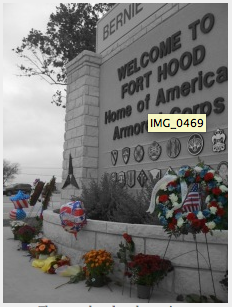A Fort Hood Sunset
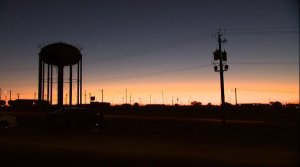
Thursday afternoon Maj. Nidal Malik Hasan, an Army psychiatrist, stormed into the Soldier Readiness Center, two handguns drawn, and started firing at whoever he could find. Some argue he had targets, others argue it was random. Although the details are still murky, it is clear that Hasan did something unthinkable, irrational, and arguably unforgivable. Some soldiers have called it the ultimate betrayal. Major Hasan turned on his own soldiers, those he had dedicated his life to protect.
Webster defines aftermath as “the consequences of an event.” By this definition the aftermath has yet to be determined–it can be hypothesized at best. What is for sure though, is that 13 brave men and women died at the hands of an Army Major, someone they looked up to for leadership and support. Usually when I write articles in my blog I start out with a clear conclusion, some final thought or idea or opinion to work towards. Today, I don’t have one; not in some dramatic speechless fashion, but in a tired, confused way. How can someone like Major Hasan (last name assumptions aside) do something like this? Instead of even attempting to answer this question, and in avoidance of simply restating facts that were blared by mainstream media for days straight, I’ll simply retell some of the things I saw. I’ll describe some of the people I met, and some of the stories they told me. I’ll leave understanding the intricacies of human atrocity to you…
The Christian Broadcasting Network sent myself, another experienced shooter, and a news producer down to Fort Hood as soon as we heard about the events that had unfolded. We arrived in the morning on Friday, roughly 20 hours after it had all started.
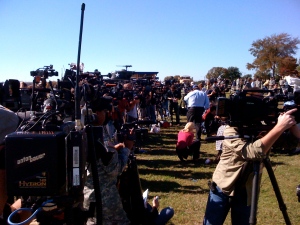
We were met by nearly every news media outlet worldwide. I overheard a French accent and glanced down to see a French Press pass. I met a gentleman from the CBC (Canadian Broadcast Corporation), who was hanging out with British Press. And as you can imagine every US groups was present too: from CNN to the LA Times. Better known as media chaos. Cameras, sat trucks (satellite trucks), tripods, reporters on cell phones, more cables than grass on the ground. It made it very difficult for the Public Affairs Office at Fort Hood. The PAO is in charge of media relations. When something this big happens they get swamped–so much so that they fly in other PAO officers to assist. Even still, with nearly 375 different news groups present, it’s hard to escort everyone around the base.
We were able to get some alone time with the 3 Corps Chaplain, Col. Michael Lembke; a happy guy with thick glasses, shaved head, and pictures of family all around his office.
His flack jacket and helmet sat next to his desk chair, propped up like a mannequin. He told us he was praying for Hasan, as God commanded we should do for our enemies. Lembke understands the betrayal and the pain. As the 3 Corps head chaplain, Lembke was among the first to visit wounded soldiers and families in the hospital. He told us of one female soldier, lying in a hospital bed, bandaged up, with Psalm 23 open at her side. Lembke recalls their conversation.
“I see you have the Bible open there. You mind if I come in?”
“Sure, come on in Chaplain Colonel, I was just working on memorizing Psalm 91,” she says.
“That’s a popular one it seems, especially on a day like today,” Lembke comments, unsure of what else to say.
“Yeah,” the female soldier says, acknowledging the day’s events with a simple nod.
Lembke rests his weight on a chair in the hospital room, letting some silence fill the room. Slowly the female soldier starts to open up, and she begins to tell her story to the Chaplain.
She was in the Soldier Readiness Center, doing some routine paperwork before going to Afghanistan in a few weeks. She heard gunfire. It took her a few moments to process what that sound meant, but when she did she shut the cubicle door, sealing off her and a few others. As soon as she heard a pause in the firing she bravely lunged at some injured people on the floor not far from the cubicle. Her and another woman dragged a few people to safety, all the way outside to a waiting ambulance. Instead of staying outside the building she ran in again, in attempt to rescue a few more injured. While rounding a corner with an injured man she encountered the shooter about forty feet away. Feeling bullets whizzing by her body, she turned the opposite direction and dragged the injured man out a side door. This time she didn’t go back in–instead she rode with the injured soldier in an ambulance to the hospital. It wasn’t until she entered the hospital lobby with the injured soldier that she felt blood soaking through her own uniform. Touching the spot with her hand, she realized that she too had been shot, but hadn’t noticed until now.
Lembke finishes telling us the story of the wounded female soldier, his eyes a little sadder than when he began. He took a few moment’s pause, then looked at us each slowly. He said simply, “in these times we must be still.” As he put it; anger, hate, forgiveness, understanding, they will all come in time. For now all we can do is be still and listen. We left Chaplain Colonel Lembke’s office with a strong thank you and a few handshakes. We didn’t really talk to each other again until we got back to media headquarters.
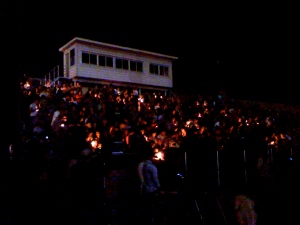
That same night we headed to a nighttime candlelight vigil. The turnout was surprisingly small, seeing how many people live on base. The soldiers and their families were handed candles on their way into what reminded me of a high school football stadium. Chaplains from the 3 Corps led the ceremony. Amazing Grace was played on a small piano positioned out on the field. People sang quietly as they lit their candles. Some wives wept while most soldiers wore glazed-over eyes. One couple sat with their candles lit for about thirty minutes after everything had ended and the stadium lights were turned back on. They were protecting their flames from the wind, staring straight ahead, both silently crying. They caught us trying not to stare and the woman carefully said to our producer, “we knew someone that died today.”
Pain was on the sleeves of men and women who happen to experience it inherently as a profession. It was the closeness and unexpectedness, most soldiers said, that caused the tears. One young couple told us after the vigil, “It’s the ultimate betrayal. You’d expect this from a private, or someone that’s enlisted, but not from an officer. Not from someone we look up to for leadership.”
As we cleaned up our camera gear and packed up our stuff, we took one last look at the stadium’s empty bleachers before heading out. The crying couple was still sitting there in a sea of metal, holding on to each other, trying to keep their candles lit and protected from the wind.
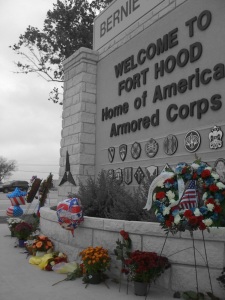
Again, I make no conclusions at the end of this. I wish I could, I really do. All I know is that I met a lot of really strong people: people who acknowledge the betrayal and broken trust, but don’t harvest rage or hate. They know the nature of these things inherently I suppose, as they encounter danger everyday on the streets of the Middle East. One soldier put it plainly, “you can’t let one guy like this, one exception, let you lose trust in your brothers. You can’t let this kind of thing make you fearful. You have to leave your house tomorrow.” And they will. And they’ll trade their homes here in the US for deserts, roadside bombs, dirty socks, death and danger. They’ll do it because it’s their job, a job that requires a great amount of bravery and sacrifice: no one can deny that. And I am indeed grateful for their abundant sacrifice.
 Next post
The Woman Who Was a Clown
Next post
The Woman Who Was a Clown
